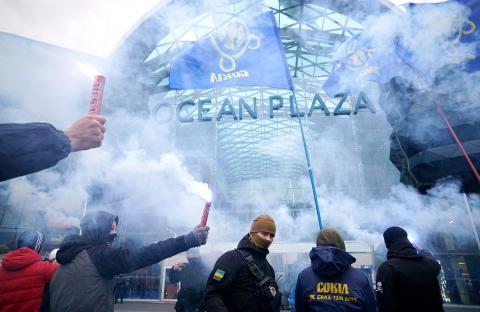Ukraine on Monday imposed martial law in some regions a day after its navy was fired on by Russia in a major re-escalation of hostilities that drew condemnations of the Kremlin from the US and the EU.
Ukrainian President Petro Poroshenko said martial law was needed to ready the nation for potential further Russian aggression amid fears that Sunday’s incident near Crimea would rekindle the simmering four-year-old conflict between the two former allies.
Ukraine’s “top priority” now is the return of 23 captured sailors and three ships, Poroshenko said yesterday.

Photo: AFP
While Ukraine’s Western partners blamed Russia, calls for harsher sanctions were only heard from smaller nations. Russia’s ruble partially rebounded Tuesday from a selloff in the previous session.
After nearly a day of silence, US President Donald Trump said he was not happy about the situation, adding: “Hopefully it’ll get straightened out.”
The sense that it is largely Europe’s problem to solve reflects the view at the White House, according to one person close to the situation.
The renewed tensions stem from events in the waters near the Crimean Peninsula that Russian President Vladimir Putin annexed almost five years ago, reviving Cold War animosity.
Six Ukrainian sailors were wounded as the ships were seized by Russia, which accused its neighbor of allowing boats to stray into its territory.
Ukraine says the incident occurred in neutral waters.
US Ambassador to the UN Nikki Haley blamed Russia’s “outlaw actions.”
The US will maintain its current Crimea-related sanctions, Haley said in a speech, stopping short of threatening additional restrictions.
US Secretary of State Michael Pompeo urged Poroshenko and Putin “to engage directly to resolve this situation” and said the US continues to reject Russia’s annexation of Crimea.
Poroshenko said on Twitter that he spoke earlier with Pompeo.
German Chancellor Angel Merkel, who spoke with Putin about the crisis on Monday, offered to help Poroshenko de-escalate the situation, which comes days before a G20 gathering in Buenos Aires.
Reviving the patriotic fervor that accompanied Putin’s annexation of Crimea in 2014 could help him offset growing domestic discontent over the economy and changes to Russia’s pension system.
“This type of foreign-policy escalation is risky and won’t help relations with the West,” Alexander Baunov of the Moscow Carnegie Center said. “But if they swallow it, then it will look like another diplomatic victory.”
The martial law measures for coastal regions and those bordering Russia took effect on Monday and are to run for 30 days, a scaled-down version of Poroshenko’s original plan for a two-month spell.
He was forced to compromise after some opposition politicians said he was seeking to delay March’s presidential elections, which polls suggest he would lose.
“As soon as a Russian soldier crosses a border, I won’t waste a second to ensure the defense of Ukrainian territory,” Poroshenko told lawmakers.
With Ukraine’s finances under pressure from looming foreign-debt payments on stress on other emerging markets, there was concern that martial law could obstruct international aid payments.
While yields on government debt sold last year jumped, the IMF said it did not have restrictions on working with Ukraine.

Kehinde Sanni spends his days smoothing out dents and repainting scratched bumpers in a modest autobody shop in Lagos. He has never left Nigeria, yet he speaks glowingly of Burkina Faso military leader Ibrahim Traore. “Nigeria needs someone like Ibrahim Traore of Burkina Faso. He is doing well for his country,” Sanni said. His admiration is shaped by a steady stream of viral videos, memes and social media posts — many misleading or outright false — portraying Traore as a fearless reformer who defied Western powers and reclaimed his country’s dignity. The Burkinabe strongman swept into power following a coup in September 2022

‘FRAGMENTING’: British politics have for a long time been dominated by the Labor Party and the Tories, but polls suggest that Reform now poses a significant challenge Hard-right upstarts Reform UK snatched a parliamentary seat from British Prime Minister Keir Starmer’s Labor Party yesterday in local elections that dealt a blow to the UK’s two establishment parties. Reform, led by anti-immigrant firebrand Nigel Farage, won the by-election in Runcorn and Helsby in northwest England by just six votes, as it picked up gains in other localities, including one mayoralty. The group’s strong showing continues momentum it built up at last year’s general election and appears to confirm a trend that the UK is entering an era of multi-party politics. “For the movement, for the party it’s a very, very big

ENTERTAINMENT: Rio officials have a history of organizing massive concerts on Copacabana Beach, with Madonna’s show drawing about 1.6 million fans last year Lady Gaga on Saturday night gave a free concert in front of 2 million fans who poured onto Copacabana Beach in Rio de Janeiro for the biggest show of her career. “Tonight, we’re making history... Thank you for making history with me,” Lady Gaga told a screaming crowd. The Mother Monster, as she is known, started the show at about 10:10pm local time with her 2011 song Bloody Mary. Cries of joy rose from the tightly packed fans who sang and danced shoulder-to-shoulder on the vast stretch of sand. Concert organizers said 2.1 million people attended the show. Lady Gaga

SUPPORT: The Australian prime minister promised to back Kyiv against Russia’s invasion, saying: ‘That’s my government’s position. It was yesterday. It still is’ Left-leaning Australian Prime Minister Anthony Albanese yesterday basked in his landslide election win, promising a “disciplined, orderly” government to confront cost-of-living pain and tariff turmoil. People clapped as the 62-year-old and his fiancee, Jodie Haydon, who visited his old inner Sydney haunt, Cafe Italia, surrounded by a crowd of jostling photographers and journalists. Albanese’s Labor Party is on course to win at least 83 seats in the 150-member parliament, partial results showed. Opposition leader Peter Dutton’s conservative Liberal-National coalition had just 38 seats, and other parties 12. Another 17 seats were still in doubt. “We will be a disciplined, orderly